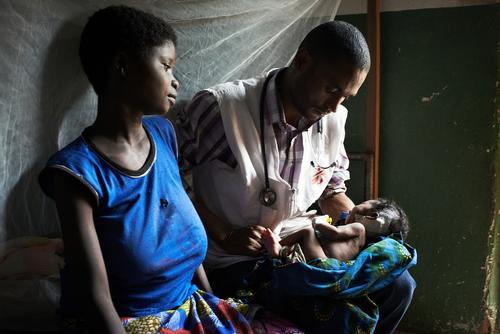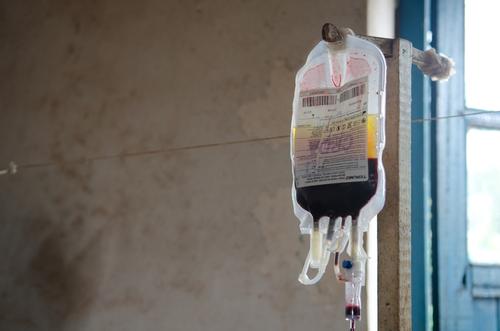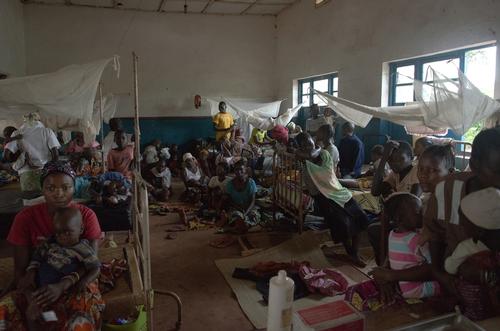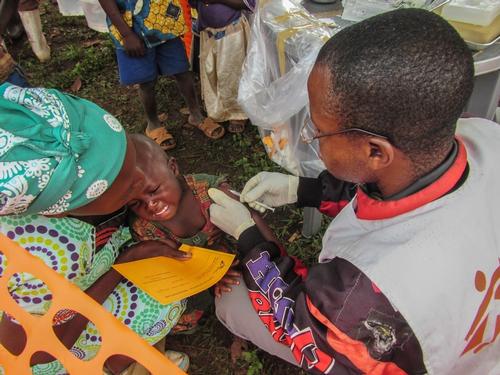Lubumbashi – After ten years of working in the centre of ‘the Triangle’, the area between Mitwaba, Manono, and Pweto, Médecins sans Frontières (MSF) is handing over its activities to the Ministry of Health (MoH) of the Democratic Republic of Congo. In the Triangle, MSF supported the referral health centre of Shamwana and seven surrounding health centres. In cooperation with the MoH, MSF provided primary and secondary health services, including the treatment of diarrhoea, malnutrition, respiratory tract infections, HIV/AIDS and tuberculosis, as well as surgical, reproductive and mental health services. MSF also trained community leaders in detecting and treating malaria through 21 community malaria sites in surrounding villages. MSF is appreciative of the strong cooperation with the MoH, which has resulted in significant improvements of health services in the region.
Nevertheless, medical needs remain high and the economic and social impact of the war has been significant. According to Rhian Gastineau, MSF Head of Mission in the former province of Katanga, “it is important to note that the departure of MSF is not an indication of the lack of the population’s needs – to the contrary, MSF’s departure is a call for much-needed development engagement. The current medical situation in the Triangle demands a response of a development actor, in cooperation with the Ministry of Health, to develop a durable health system.”

Nevertheless, medical needs remain high and the economic and social impact of the war has been significant. According to Rhian Gastineau, MSF Head of Mission in the former province of Katanga, “it is important to note that the departure of MSF is not an indication of the lack of the population’s needs – to the contrary, MSF’s departure is a call for much-needed development engagement. The current medical situation in the Triangle demands a response of a development actor, in cooperation with the Ministry of Health, to develop a durable health system.”
Moreover, although the security context is relatively stable, many families continue to live in fear of insecurity; especially those families that only recently have returned after extended displacement due to violence in 2012 and 2013. As one patient describes, "we still suffer from the war. We cannot fall asleep and everybody is awake by 3am – that is when the attacks occur. My children have many nightmares. We have bullets in our heart."
Given the continued vulnerable state of the population and the significant medical needs that remain, MSF stresses the importance of the continuity of care following its departure. According to Gastineau, “it is vital that tests and medicines remain available in order to ensure early detection and proper treatment.” MSF highly encourages the MoH to ensure the continuation of accessible, quality care and calls on local authorities to ensure the continued protection and security of the local population.
Unfortunately, patients in Katanga province face multiple barriers to accessing quality medical care, and the Triangle area is no exception. MSF remains present in the former Katanga province – as well as in other parts of the Democratic Republic of the Congo – intervening in medical and humanitarian emergencies, and responding to cholera, malaria, measles, malnutrition and population displacement.
MSF expresses its deepest gratitude and appreciation to our dedicated Congolese colleagues, who have not only been successfully collaborating, but who have also been the backbone of the Shamwana project over the past ten years.
MSF has been present in DRC since 1981 and in Shamwana, in particular, since May 2006, providing health care to people living in the Kiambi, Mitwaba and Kilwa health zones.





